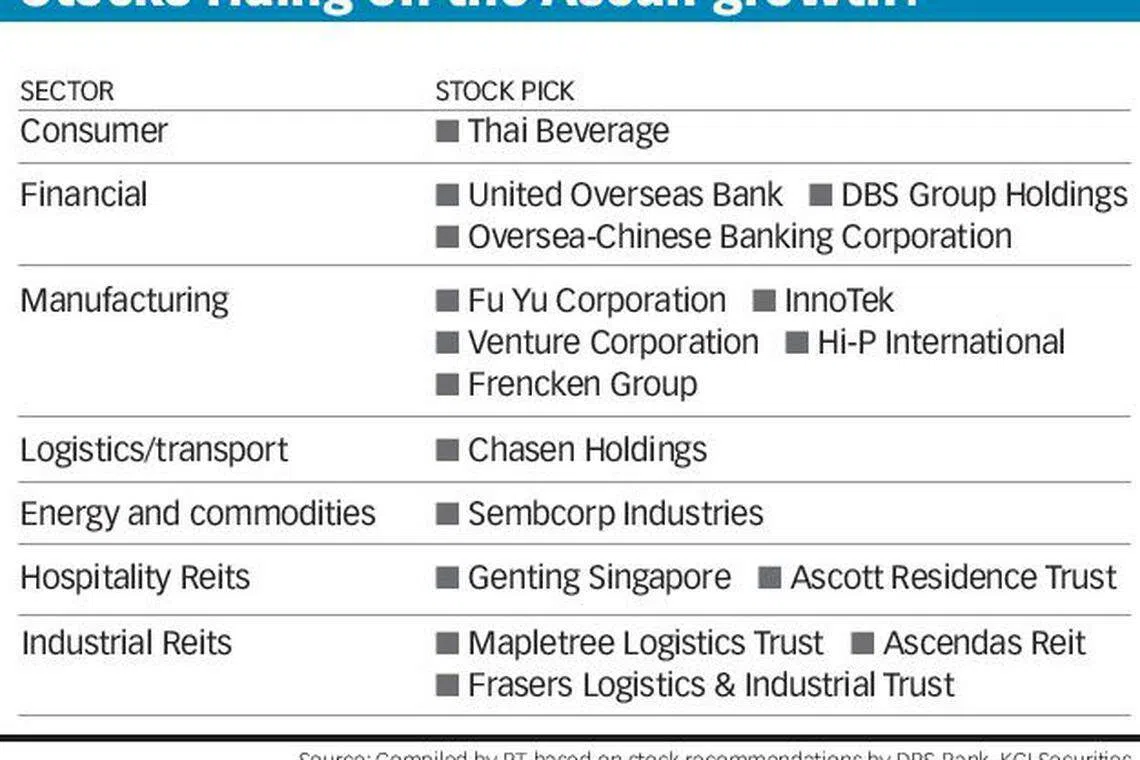Asean growth story holds potential for some SGX stocks
Analysts optimistic on sectors driven by domestic demand and consumption
Claudia Tan HS
Singapore
DESPITE challenging economic conditions amid the United States-China trade war, Asean continues to see resilient growth on the back of manufacturing diversification, trade diversion and favourable demographics, said analysts.
With a population of close to 650 million and a rapidly growing middle class, Asean is poised to become the fourth largest single economy in 2030, behind Europe, US and China.
Analysts are therefore pointing to a number of Singapore Exchange (SGX)-listed stocks that may ride the Asean growth story, particularly in sectors driven by domestic demand and consumption.
"In an environment where global growth is slowing and exports are affected by trade war, domestic demand stocks should be more resilient than export stocks," said Joanne Goh, regional equity strategist at DBS Bank.
Thailand's beverage producer Thai Beverage PCL (ThaiBev) came in as SGX's strongest Straits Times Index stock for the first seven months of 2019, generating a total return of 40 per cent and net interest income of S$139 million.
ThaiBev's acquisition of Sabeco, which holds the largest share of the beer market in Vietnam, and Grand Royal Group in Myanmar, allowed it to tap on a population of 150 million in markets that have experienced high growth rates in income and consumption.
Analysts also favoured local banks given their high involvement in trade-related activities. In a note by Maybank KimEng on July 1, it said Singapore banks reported trade-related sectors seeing rising credit demand to benefit from the trade war.
"We believe this rising credit demand may be a sign of manufacturing and logistics capacity relocating from China and ramping up in Asean," the note said.

Among the local banks, UOB emerged as a stock pick for CGS-CIMB analyst Lim Siew Khee.
"UOB has the largest Asean exposure among local banks, it also recently opened a new branch in Hanoi," said Ms Lim.
UOB continues to strengthen its presence in Vietnam with the opening of its Hanoi branch, a year after incorporation of its fully-owned subsidiary in Vietnam. UOB is projecting growth at 6.7 per cent and inflation of around 3.4 per cent for 2019.
Vietnam has long been identified as one of the key destinations for foreign manufacturers relocating production facilities. Its economy expanded 7.1 per cent in 2018, the fastest growth in 11 years.
Head of research at KGI Securities Joel Ng said tech manufacturing firms with facilities in South-east Asia are likely to benefit. Some of his stock picks include Fu Yu, Innotek, Venture Corp, Hi-P and Frencken.
"It is mainly the Singapore tech-manufacturers that have the most exposure to trade-related businesses that export to the US," said Mr Ng.
"These companies first started out in Singapore and Malaysia and eventually moved to China when costs were cheap there. However, many of them still have existing facilities in South-east Asia and hence are well positioned to capture the ongoing shift of the supply chain from China," he said.
Jarick Seet, head of Singapore small and mid-cap research at RHB Securities shared similar sentiments.
"I think Fu Yu would be a good proxy for a rise in intra-Asean trade as besides China, they have factories in Singapore and Malaysia. They will likely benefit from the increase in volume or customers if more of them switch their supply chain to South-east Asia," he said.
Relocation service companies that specialise in handling manufacturing equipment will also stand to benefit. Chasen Holdings, being the only SGX-listed company that specialises in relocation solutions for the manufacturing sector, can expect favourable tailwinds in its main business, according to a report by KGI Securities' Mr Ng.
In FY2019, Chasen Holdings' revenues from China accounted for 36 per cent of total revenues, while 56 per cent is derived from countries in South-east Asia.
The report noted that the supply chain disruption due to the trade war gives the company an edge as businesses look to shift their manufacturing capacity to other South-east Asian countries.
CGS-CIMB's Ms Lim also expects Sembcorp Industries to gain from the ongoing US-China trade war.
"Its urban development division will be a direct beneficiary from the rising Asean growth especially if more supply chains are routed via Vietnam," she said.
On the other hand, DBS' Ms Goh said they favour industrial property developers and owners in the region.
"Asean industrial property can benefit from low interest rates, e-commerce and China's diversification story," said Ms Goh.
She cited Mapletree Logistics Trust, Ascendas Reit and Frasers Logistics & Industrial Trust as stock picks.
Investors can also look to hospitality Reits like Genting Singapore and Ascott Residence Trust that capture the middle-class tourism expenditure in Asean given the emerging middle-class in the region and high levels of intra-Asia travel.
"Ascott Residence Trust has around 30 per cent of its assets under management in Asean, potentially benefitting from increased travel and tourism in the region," said Ms Lim.
However, analysts have also pointed out that the shift of supply-chain businesses towards Asean is happening in stages.
According to Paul Chew, head of research at Phillip Securities, the main countries benefiting from the move to Asean have been Malaysia, Thailand and Vietnam.
These countries are the ones that have cemented their positions as traditional manufacturing playgrounds in the region.
But there has been some pushback due to the ability of some supply chains like those in Vietnam to cope efficiently with the surge in volume, he said.
Still, most analysts see Asean as a key beneficiary despite the trade war.
"The growth in Asean is more resilient when compared to the export-oriented economies such as Taiwan and Korea," said Ms Goh.
Since the threats from the trade war escalated last year, Chinese and foreign manufacturers have looked into trade diversion and manufacturing diversification.
"We believe Asean economies should be benefitting from the trend," she said.
Copyright SPH Media. All rights reserved.
